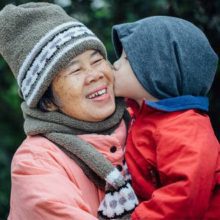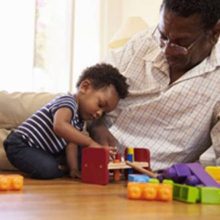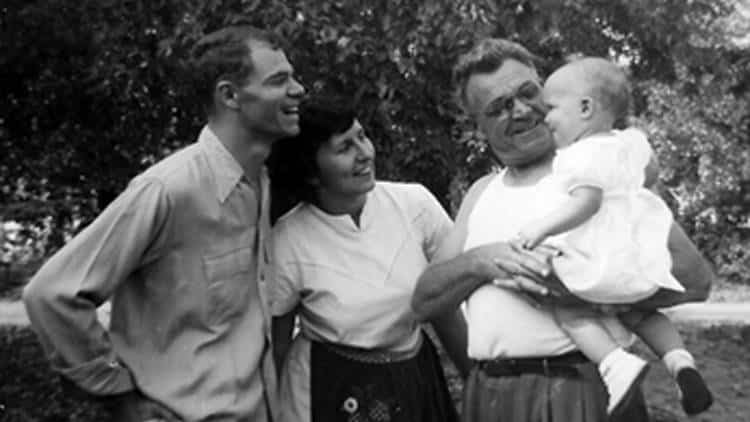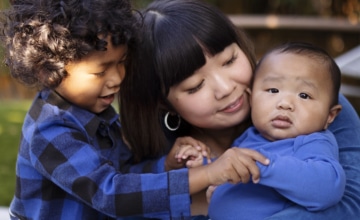Different generations have different ideas about parenting. Here’s how to share the care.
I was in elementary school when my grandpa arrived at our house late one summer afternoon with a big box of ice cream bars. Neighbor kids flocked to his car as if signaled by some unseen kid-radar. My mom was not a fan of treats before dinner, but it was understood that this was a special case. My grandpa was larger-than-life—big car, big voice, big box of ice cream bars. And even better, exempt from the rules of our household.
It was up to my mother—who was smart and savvy—to navigate the distance between her dad’s way of doing things and hers. In many households in the United States, grandparents play a critical role in raising young children. Figuring out how to comfortably share the care is step one.
Help wanted.

In 2011, 4.8 million children in the U.S. under 5 years old were cared for by grandparents while parents worked or went to school—nearly 1 out of 4 children in this age group. Grandparents help ease the financial burden when formal child care is unaffordable. And they offer added benefits: love, convenience, and security. Grandparents are a cornerstone of child care for young children, caring for about the same number of kids as are enrolled in formal child care programs.
How do families fare when grandparents step up to help with child care? ZERO TO THREE asked, and grandparents answered, in three focus groups conducted in the spring of 2017.
Feeling the love.
 All the grandparents we spoke with provided at least 15 hours of care each week to grandchildren under 6 years old. There was universal agreement that becoming a grandparent was a joyful experience. Grandparents didn’t consider their time with grandkids as “babysitting” or “caregiving,” but said they were simply “spending time” together. Participants beamed with pride as they shared cell-phone photos and stories.
All the grandparents we spoke with provided at least 15 hours of care each week to grandchildren under 6 years old. There was universal agreement that becoming a grandparent was a joyful experience. Grandparents didn’t consider their time with grandkids as “babysitting” or “caregiving,” but said they were simply “spending time” together. Participants beamed with pride as they shared cell-phone photos and stories.
Debbie: “My grandchildren, it’s just a joy… It’s like your own children, but it’s in a different way, a different love.”
Carl’s voice was thick with emotion as he described the continuity between generations: “I have a picture of when my daughter was little, and she was holding my hand. We were walking together. My daughter took a picture of me and [my 2-year-old grandson] doing the same thing.”
Relying on experience.
 Grandparents said they were more relaxed, confident, and patient than they’d been with their own kids.
Grandparents said they were more relaxed, confident, and patient than they’d been with their own kids.
Pat: “When we have our own children, we are experimenting…we are trying to learn and trying to know. When the grandkids come along, we see it a little different.”
Yolanda: “We’re a lot more relaxed. We realize things are going to be ok. When you’re young, you’re like ‘What about this, that?’ And as you get older, you realize…it is going to be ok.”
Navigating the distance.
Some grandparents described their child care arrangements as a successful partnership between themselves and their adult children. But conflicts arose here and there—much as they did when my mother was a young mom. Not surprisingly, mealtime rules are still an issue, as are discipline strategies.
When more than one generation is involved in child care, communication can be a challenge. Parents may worry that grandparents don’t respect their role as the rule-setter for their families. Grandparents may feel as through a lifetime of caregiving experience is unacknowledged and may have trouble resisting the impulse to point out “a better way” of doing things. As one grandmother explained: “You need to learn boundaries…my son, I call him Dr. Spock. He knows everything.”
If you’re part of a family that’s sharing child care, keep in mind that parents and grandparents also share the same mission—a happy, healthy child. It’s important to take some quiet moments to discuss the best strategies to reach that goal. Share appreciation for each other’s help and experience. Talk about differences in parenting philosophy and how they might be addressed. Know that you are in this together.
Discovering what’s new.
Want to know more about child care strategies suitable for sharing with the grandparents in your life? Check out our Grandparent Guide for the latest info on what’s changed and what’s stayed the same since today’s grandparents were parents themselves. You’ll find practical tips on setting limits with love, keeping the peace at mealtimes, creating a safe space to sleep, and making the most of time with grandchildren.
And don’t miss our resources for organizations serving three-generation families. See our Infographics for more quotes and details. Try our If You Only Knew guide that may help families talk about shared strengths, communication concerns, and problem-solving strategies. And please visit 7 Things You Should Know About Grandparents for a summary of our focus-group findings.




